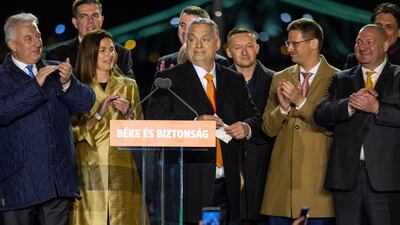Hungary's strongman leader Viktor Orban taunted the EU after he won a fourth term on Sunday in an election victory he said was “so great that you can see it from the Moon — certainly from Brussels”.
Mr Orban defeated a six-party coalition that had joined forces in an attempt to oust the prime minister, who is regarded by EU officials and domestic critics as having eroded Hungary’s democracy during his 12-year rule.
His Fidesz party was on course for 53 per cent of the vote and more than two thirds of seats in the 199-member parliament, after a campaign in which the opposition complained of being drowned out by pro-government media.
Rival candidate Peter Marki-Zay, whose opposition bloc won 35 per cent of the vote, bemoaned what he said was “12 years of brainwashing” as he conceded what he called a devastating defeat.
“I don't want to hide my disappointment and sadness,” he said. “There's no way to sugar-coat it.”
Mr Orban, who clashed with President Volodymyr Zelenskyy during a campaign overshadowed by the crisis in Ukraine, said the result ensured peace and security after touting himself as the candidate who would stay out of the war.
“We never had so many opponents,” Mr Orban said in his victory speech, reeling off a list that included “Brussels bureaucrats … the international mainstream media and, in the end, even the Ukrainian president".
“The whole world has seen that Hungarians love their country,” he told a jubilant crowd chanting his name in Budapest, many of them wearing Fidesz's orange colour.
A far-right party called Our Homeland, which is not part of the united opposition front, was also set to make it into parliament with seven seats. Turnout was 68.7 per cent, almost matching the record participation at the last election in 2018.
The result ensures Mr Orban, already the EU's longest-serving leader after Angela Merkel's retirement in Germany, will remain a sometimes dissenting voice in the 27-member European Council as it tackles the fallout from the war in Ukraine.

Although he did not stand in the way of the first four rounds of sanctions, he is firmly opposed to any embargo on Russian energy and has long been regarded as one of President Vladimir Putin’s closest allies in Europe.
The opposition bloc had tried to exploit that to paint Mr Orban as a stooge of Moscow after a blistering attack on him by Mr Zelenskyy in a video address to an EU summit in Brussels.
Mr Orban brushed off that attack and accused the left-wing parties of wanting to drag Hungary into the conflict, while offering sweeteners such as pension bonuses and tax cuts before voters went to the polls.
The EU has also been at loggerheads with Hungary over what are regarded in Brussels as declining democratic standards, including the freedom of the media and the independence of the judiciary.
More than 200 international observers monitored the election in Hungary, which could be deprived of EU funds if its disputes with the European Commission are not settled.
Hungary has found common cause with Poland in resisting pressure from Brussels on that front, but the two countries differ over Ukraine, with the government in Warsaw taking a firmly anti-Russian stance.
French and Italian far-right leaders Marine Le Pen and Matteo Salvini were quick to offer their congratulations to Mr Orban on Sunday.
Ms Le Pen, who is gaining ground in polls before the first round of presidential elections in France next weekend, posted a picture of herself shaking hands with Mr Orban with the caption: “When the people vote, the people win.”


